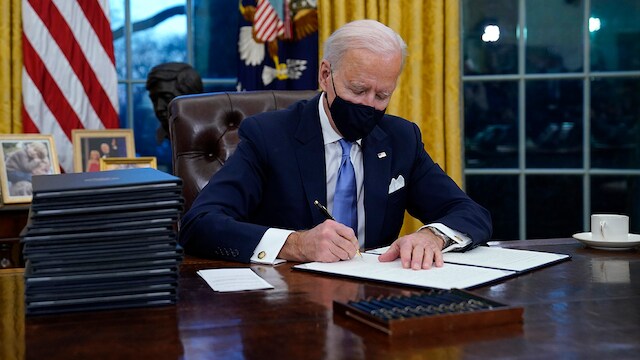On his first day in office, President Joe Biden is beginning the immense task of dismantling former President Donald Trump’s nativist legacy on immigration, issuing an executive order to end Trump’s controversial travel ban on noncitizens from 13 countries.
The policy, colloquially known as the “Muslim ban,” first went into effect in January 2017 and became one of Trump’s signature immigration policies. The ban has slowed or altogether halted legal immigration from certain countries that the former administration deemed to be security threats, keeping families apart and even stymieing refugee resettlement.
The travel ban was Trump’s first major action on immigration policy, setting the tone for the chaotic four years that followed for immigrants while galvanizing public opposition.

When the ban was announced, it resulted in mass protests in airports across the US where people from the affected countries, which were initially limited to those with majority-Muslim populations, were held for questioning for hours.
This led immigrant advocates to call it a discriminatory “Muslim ban,” citing Trump’s campaign promise to establish a “total and complete shutdown of Muslims entering the United States.” Democrats in Congress, who for years had expressed conflicting positions on immigration policy, coalesced in opposition to the policy, using it to present a united front in condemnation of the xenophobia it represented.
The ban was amended several times in the face of numerous court challenges arguing that Trump did not have the legal authority to issue it and that it unlawfully discriminated against Muslims. The third version of the ban, ultimately upheld by the Supreme Court, barred citizens of seven countries — Iran, Libya, Somalia, Syria, Yemen, Venezuela, and North Korea — from obtaining any kind of visas, largely preventing them from entering the US. (Chad was taken off the list of countries subject to the ban in April 2019 after it met the Trump administration’s demands to share information with US authorities that could aid in efforts to vet foreigners.)
Trump expanded the ban last February to include additional restrictions on citizens of six more countries: Myanmar, Eritrea, Kyrgyzstan, Nigeria, Sudan, and Tanzania. While they could still visit the US, citizens of these countries were, for the most part, barred from settling in the US permanently.
Ending the ban was one of Biden’s topline campaign promises on immigration policy — and he is about to deliver. But this executive order only marks the beginning of a project to erase Trump’s influence on the immigration system, which was primarily concerned with keeping people out through a vast network of executive orders, policy memos, and regulatory changes









